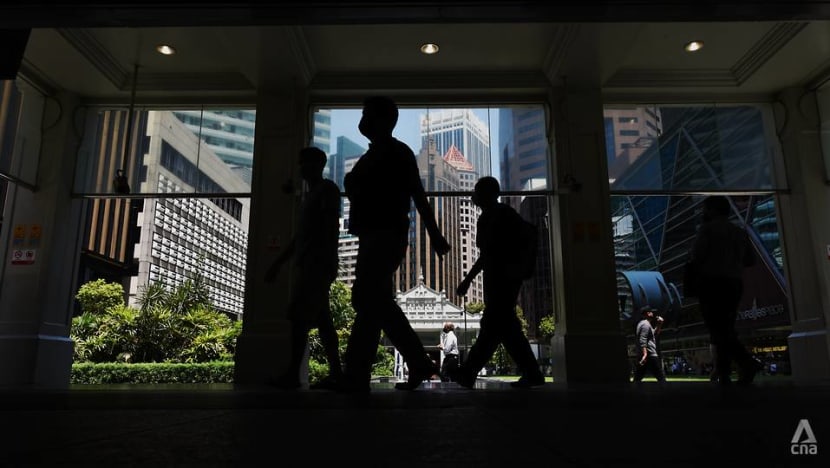All employers urged to adopt COVID-19 'vaccinate or regular test' as company policy: Tripartite partners

Office workers walking along Raffles Place MRT Station. (File photo: Calvin Oh)
SINGAPORE: All employers are encouraged to consider adopting the COVID-19 "vaccinate or regular test" regime as company policy for existing employees and new hires, Singapore's tripartite partners said on Monday (Aug 23).
As part of this, they may implement vaccination-differentiated measures in the workplace, including requiring medically eligible but unvaccinated employees to bear coronavirus-related expenses, such as for their swab tests.
This is to protect employees and make workplaces more resilient, the Ministry of Manpower, National Trades Union Congress and Singapore National Employers Federation as well as the Ministry of Health (MOH) said in an advisory.
The "vaccinate or regular test" regime, which requires unvaccinated workers in selected sectors to be tested for COVID-19 twice a week using antigen rapid tests, will start for selected sectors on Oct 1.
People working in the healthcare sector, eldercare sector and settings with children 12 years and below will be covered by the regime. Workers in industries that interact with customers in high-risk mask-off settings, such as at Singapore's borders or COVID-19 frontline work, will also be subject to the requirements.
Other workplace settings include food & beverage establishments, gyms and fitness studios, personal care services, shopping malls and supermarkets. Taxi and private hire drivers, last mile delivery workers, driving school and private driving instructors as well as public transport frontline staff must also follow the regime.
The public service, Singapore's largest employer, will also implement the regime for its employees.
VACCINATION-DIFFERENTIATED MEASURES
Employers may adopt differentiated workplace measures for vaccinated and unvaccinated employees in consultation with the unions, according to the advisory.
Setting out these measures, the tripartite partners said employers can adopt the "vaccinate or regular test" regime on a voluntary basis and subject unvaccinated employees to additional COVID-19 tests.
They can take reference from MOH's guideline of twice a week in deciding the frequency of such testing. Tests done under the existing fast and easy testing or rostered routine testing count towards this requirement.
Employers can also require unvaccinated employees to undergo pre-event testing before participating in work and social events.
While unvaccinated workers can continue to be deployed in higher-risk activities with regular testing, employers may decide whether to redeploy them to another job with a lower risk of COVID-19 infection. This should commensurate with their experience and skills, said the tripartite partners.
Employers can also implement other workplace measures of their own accord.
"In doing so, employers must be prepared to justify to employees and/or the Government (e.g. in the event of a dispute) that such measures are reasonable and necessary for business operations and to better protect the health and safety of all employees," stated the advisory.
BEARING ADDITIONAL COSTS
Companies can also require employees who choose not to be vaccinated to bear coronavirus-related expenses.
This applies only to unvaccinated employees who are medically eligible for the vaccine. Employees who are ineligible for the mRNA COVID-19 vaccines - Pfizer-BioNTech/Comirnaty and Moderna - are excluded from bearing such costs.
Examples of coronavirus-related expenses that can be recovered from unvaccinated employees include the costs of test kits and stay-home notice accommodation, said the tripartite partners.
They also noted that unvaccinated employees may be discharged later from treatment or may be served with longer periods of movement restrictions, such as stay-home notice, compared to vaccinated employees.
In such situations, employers can require that unvaccinated employees serve these additional days from existing leave entitlements, or if those have been exhausted, to place them on no-pay leave.
Employers can also choose to exclude unvaccinated employees from medical benefits associated with COVID-19, such as insurance coverage.
"Under no circumstances should an employer terminate or threaten to terminate the service of an employee on the basis of vaccination status alone", said the tripartite partners.
Employees also should not be placed on no-pay leave for an extended duration without their mutual consent in writing, they added.
"However, employers may exercise their right to contractually terminate employment if unvaccinated employees do not comply with reasonable vaccination-differentiated workplace measures."
PROOF OF VACCINATION
All employers may ask employees for their vaccination status for business purposes, such as business continuity planning. Companies that adopt the "vaccinate or regular test" regime can also ask employees for proof of vaccination, said the partners.
"Employees who refuse to do so would be treated as unvaccinated for the purposes of the vaccination-differentiated measures and the bearing of costs," they said.
The partners said that employers should also facilitate COVID-19 vaccinations, including by granting paid time-off to employees for the jab and additional paid sick leave in the event an employee experiences a vaccine-related adverse reaction.
Employers who adopt the "vaccinate or regular test" regime as company policy were urged to communicate clearly and in advance to affected employees and jobseekers.
As of Aug 21, 78 per cent of Singapore's population has completed their full regimen or received two doses of COVID-19 vaccines, while 82 per cent has received at least one dose, according to MOH's daily update on Sunday.
"Although Singapore’s vaccination rates are one of the highest in the world, we need to continue to expand our vaccine coverage to optimise our resilience against COVID-19," said the tripartite partners.
BOOKMARK THIS: Our comprehensive coverage of the COVID-19 pandemic and its developments
Download our app or subscribe to our Telegram channel for the latest updates on the coronavirus pandemic: https://cna.asia/telegram

















